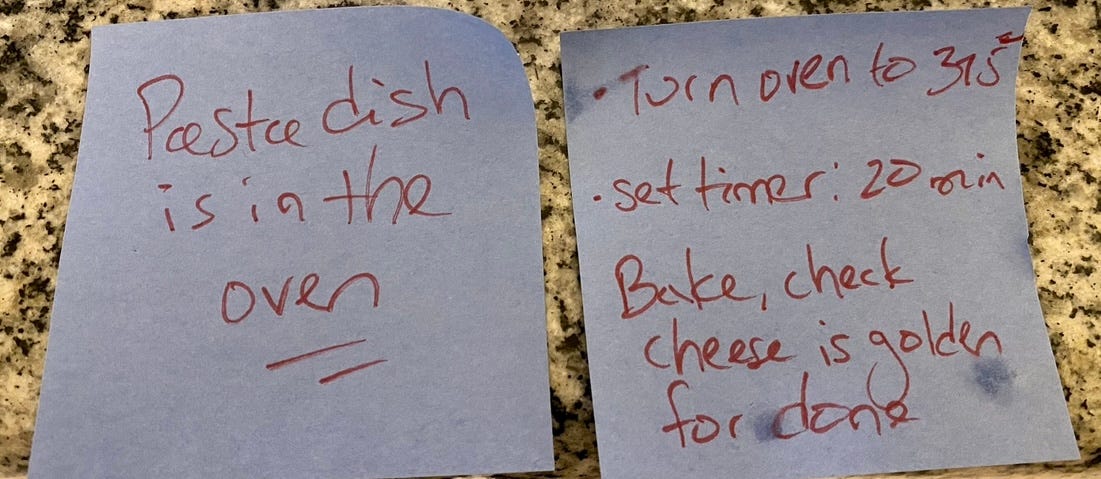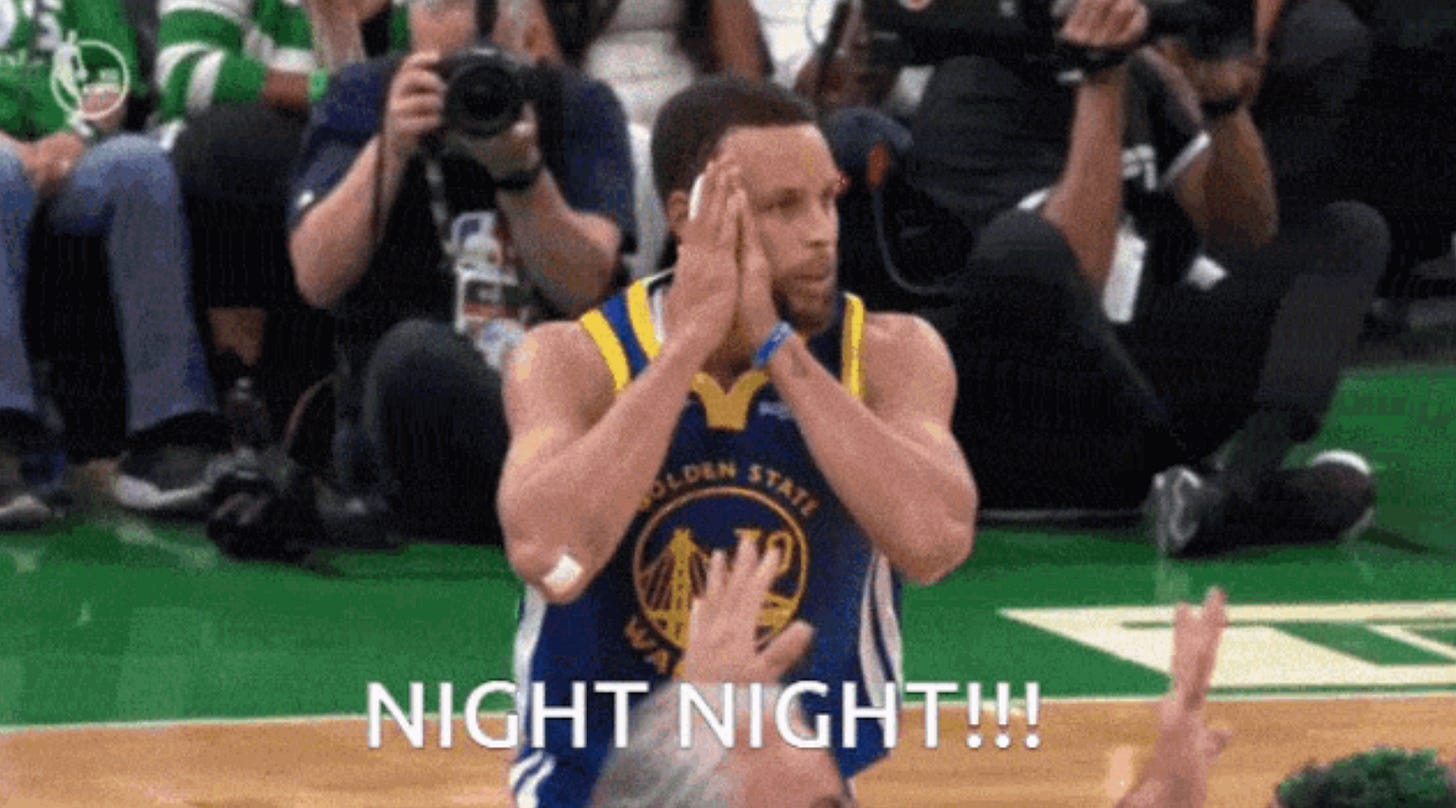A Recipe For Support
Asking for help doesn't have to suck.
“Pasta dish is in the oven,” read the lavender post-it note in bright red Sharpie on the counter. “Turn oven to 315. Set timer 20 min. Check cheese is golden for done.”
This is my partner’s love language. And that’s the level of guidance I sometimes need to bake an already prepped meal successfully 🤷🏽♀️
Two weeks ago my husband, Jared, broke his wrist in a mountain biking accident. Parenting a roly-poly 14-month old with three adult arms is cruxy, to say the least. Evenings have become a choreographed enterprise as I follow his instructions while struggling to maintain my composure with the writhing bodies of our dog and child beneath us.
Ten years into our relationship, Jared knows to take a paint-by-numbers approach to helping me cook. He gives me an outline, suggests shading, and then lets me have-at-it. Unless I’m in crisis. Then we transition into full Ikea assembly mode, like for that pasta dish, with step-by-step instructions that a 5-year-old could follow.
We’ve learned there’s a subtle, but important, difference between guiding and hand-holding me in the kitchen. Knowing which to ask for, and when, is an insight that has served me in more places than my marriage.
***
Working in tech as the daughter of a preacher and a teacher with a state-school undergraduate degree I sometimes don’t have the language or frameworks that my peers do. That used to leave me feeling like an idiot, when, for instance, the 6-foot tall dude with a perfect middle part would implore me to, “Take a first-principles approach” in the comments of my doc. (WTF does that even mean 🤯)
To be clear, this is not a knock on my education or background. It’s more that there’s a certain similarity in the way people make sense of the world when they graduate from a place like Stanford or grow up amidst adults who work in industries like law, finance and tech. I’ve spent countless nights deconstructing others' work to try and find patterns to copy to ensure I’m communicating my ideas in a way that resonates in these linear, structured environments.
Even then I often feel off-key, like I’m grasping for the scale and tonic notes so that I can jam and improvise with their tune.
***
My big unlock didn’t come in a flash of brilliance. There wasn’t one singular experience that taught me, “Aha! This is how I know what I need to be a great employee/leader/partner.” Rather, like most of life, it came from the mundane consistency with which I failed.
After far too many culinary combats, “I already put butter in the pan, dammit!” and countless critical queries from a boss, “It’s still not good enough?!” I realized I needed to stop focusing on my shortcomings and dig into their motivations.
Here are three things I’ve learned help me get the support I need when trying something challenging (at work or home 😉):
1. Gather context
I think differently than many people around me. That can be a huge strength. ✨ The key is to know when to flex my intuitive, lateral approach and when to lean in with curiosity about why my work isn’t landing right.
⛔”Ok, I’ll try again.”
✅”I want to make sure I clearly understand what you are asking me to do. Is your assumption that if I do X in this particular way, we will accomplish Y?
⛔”Sure, next time, I’ll do it the way you want.”
✅”Can you help me understand why doing it in this way will help us achieve our shared goals?”
2. Admit the obvious and ask for examples
It’s really hard to say, “I am clueless right now.” It’s even harder to admit, “I’m feeling very insecure about this task.” But we have to start somewhere. Doing it in a way that invites engagement is key.
⛔”I don’t know how to do this.”
✅”I can see that the way I am approaching this is not what you had in mind. I need an analogous example of how you’ve seen this done well. Could you walk me through what that would look like or put me in touch with someone that is excellent at it?”
⛔”Ok, let me try again.”
✅”I’m a bit lost here. Can you be specific about what was missing from the first iteration? Do you have a “best-in-class” framework or template that I might be able to leverage during this next attempt?”
3. Explicitly ask for encouragement:
Roll your eyes, but affirmation is key when learning a new skill (yes, your Gen Z colleague is onto something 🙄). It’s why my toddler, when ambling up a staircase on all fours like a drunken sloth, will screech to a halt, seek out my eyes with her big brown pools and once gaining my nod of approval, wiggle her tail with glee before she awkwardly barrels forward.
⛔”Let me know if you have any feedback.”
✅”Thank you so much for the feedback. I’d also like to understand better what I am doing right so that I can double down on that next time.”
⛔”I’m glad you liked it.”
✅”Yay, glad it worked this time. What specifically did you like about it?”
Relationships are hard. Asking for help is really hard. Knowing what kind of help you need is even harder.
But the best part about this whole damn thing is that when we take the time to figure that out and teach others how to help us, they generally walk away learning something new too. And in rare moments, they feel heroic in the process.
Like last night, when my dispassionate husband informed me that while it bothers him how I keep the water on full-blast while washing the dishes, “It’s been nice to see you in the kitchen more.” Which is basically his version of Steph Curry’s crowd-hyping, mic-dropping “Night Night” move. Good job kid.
This is my fourth essay while participating in Write of Passage Cohort 11. Huge thanks to everyone who helped me edit and refine! Family Group Chat Charlie BleeckerBecky Isjwara. With a special thanks to Wes Kaoand Deb Liu for the stellar examples on how to communicate core concepts about work and life.
2 Things That Caught My Attention This Week:
📖 A Heart That Works: This is a short book about grief, written by a comedian. It’s astoundingly effective at making you cry and laugh simultaneously. The writing is real, raw and beautiful. If you or anyone you know needs help articulating the experience of loss, this is it.
“The situation with Mira is one of those ancillary pains that accompany your child’s death, like a barnacle on the whale swimming in and out of your guts day and night.”
🎧 Is there a sane way to use the internet? This podcast goes deep into the underlying rules and structures of how we consume content. This line from Jenny Odell’s work, really stuck with me:
“What if we spent more time with the people who had the context to understand us and less time trying to create things for people who have no context?”




Okay, Cris! This may be one of my favorite pieces of WOP! i was laughing so hard-
“Parenting a roly-poly 14-month old with three adult arms is cruxy, to say the least.”
The Steph Curry reference 🤣
It was SO well written, and so enjoyable. I also am with you in the kitchen. Maybe we should ask David to start a cooking class... 🤣
"I realized I needed to stop focusing on my shortcomings and dig into their motivations."
Love this Cris! Great reminders and advice. Thanks for sharing!